The Impact of Williams v Roffey
VerifiedAdded on 2020/01/23
|7
|2992
|421
Essay
AI Summary
This assignment examines the landmark case of Williams v. Roffey Bros & Nicholls (Holdings) Ltd and its influence on the legal concept of consideration. It delves into how the case challenges established principles set forth in earlier decisions like Foakes v. Beer, analyzing the arguments presented by both sides and exploring the differing interpretations of the ruling across various courts. The assignment also considers the potential implications of Williams v. Roffey for the future development of contract law.
Contribute Materials
Your contribution can guide someone’s learning journey. Share your
documents today.
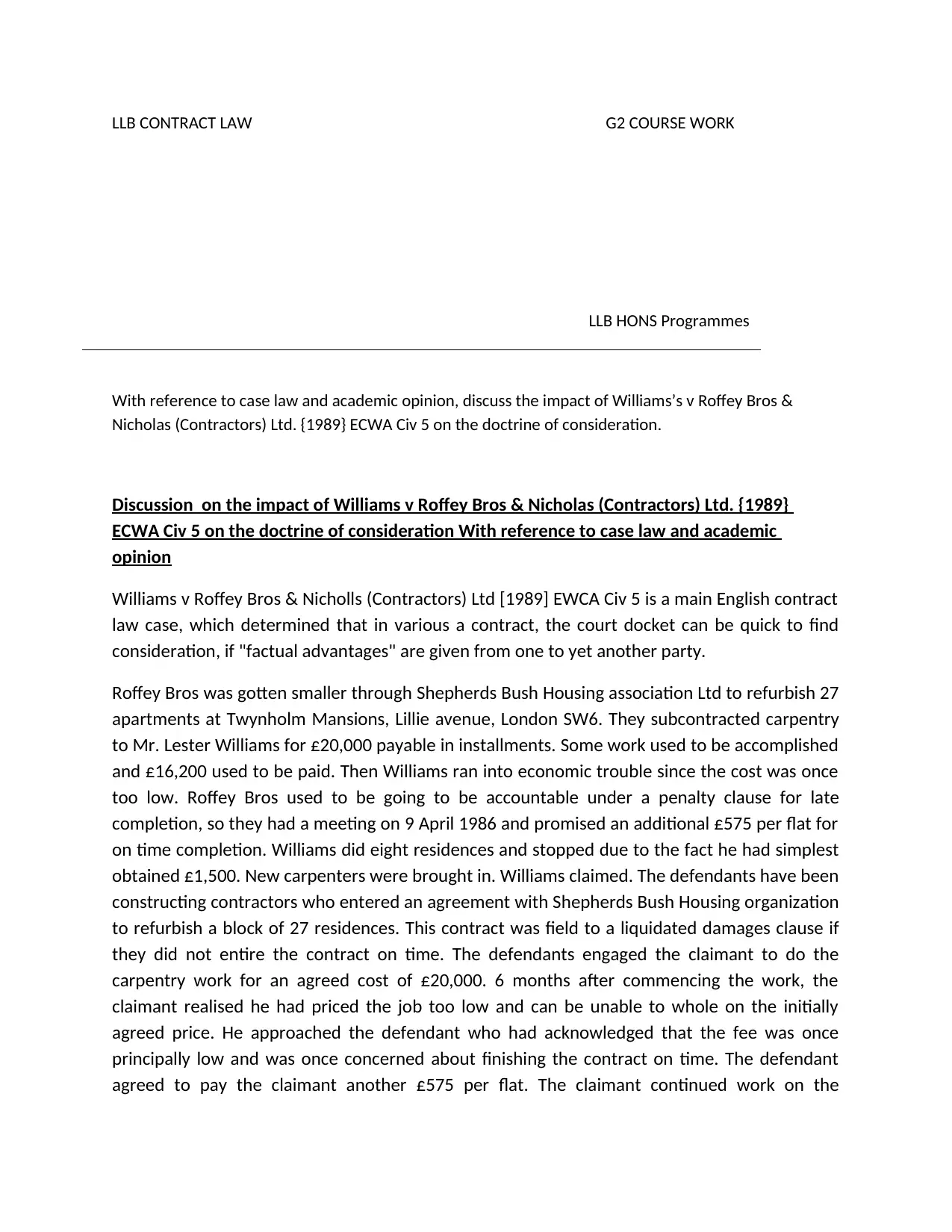
LLB CONTRACT LAW G2 COURSE WORK
LLB HONS Programmes
With reference to case law and academic opinion, discuss the impact of Williams’s v Roffey Bros &
Nicholas (Contractors) Ltd. {1989} ECWA Civ 5 on the doctrine of consideration.
Discussion on the impact of Williams v Roffey Bros & Nicholas (Contractors) Ltd. {1989}
ECWA Civ 5 on the doctrine of consideration With reference to case law and academic
opinion
Williams v Roffey Bros & Nicholls (Contractors) Ltd [1989] EWCA Civ 5 is a main English contract
law case, which determined that in various a contract, the court docket can be quick to find
consideration, if "factual advantages" are given from one to yet another party.
Roffey Bros was gotten smaller through Shepherds Bush Housing association Ltd to refurbish 27
apartments at Twynholm Mansions, Lillie avenue, London SW6. They subcontracted carpentry
to Mr. Lester Williams for £20,000 payable in installments. Some work used to be accomplished
and £16,200 used to be paid. Then Williams ran into economic trouble since the cost was once
too low. Roffey Bros used to be going to be accountable under a penalty clause for late
completion, so they had a meeting on 9 April 1986 and promised an additional £575 per flat for
on time completion. Williams did eight residences and stopped due to the fact he had simplest
obtained £1,500. New carpenters were brought in. Williams claimed. The defendants have been
constructing contractors who entered an agreement with Shepherds Bush Housing organization
to refurbish a block of 27 residences. This contract was field to a liquidated damages clause if
they did not entire the contract on time. The defendants engaged the claimant to do the
carpentry work for an agreed cost of £20,000. 6 months after commencing the work, the
claimant realised he had priced the job too low and can be unable to whole on the initially
agreed price. He approached the defendant who had acknowledged that the fee was once
principally low and was once concerned about finishing the contract on time. The defendant
agreed to pay the claimant another £575 per flat. The claimant continued work on the
LLB HONS Programmes
With reference to case law and academic opinion, discuss the impact of Williams’s v Roffey Bros &
Nicholas (Contractors) Ltd. {1989} ECWA Civ 5 on the doctrine of consideration.
Discussion on the impact of Williams v Roffey Bros & Nicholas (Contractors) Ltd. {1989}
ECWA Civ 5 on the doctrine of consideration With reference to case law and academic
opinion
Williams v Roffey Bros & Nicholls (Contractors) Ltd [1989] EWCA Civ 5 is a main English contract
law case, which determined that in various a contract, the court docket can be quick to find
consideration, if "factual advantages" are given from one to yet another party.
Roffey Bros was gotten smaller through Shepherds Bush Housing association Ltd to refurbish 27
apartments at Twynholm Mansions, Lillie avenue, London SW6. They subcontracted carpentry
to Mr. Lester Williams for £20,000 payable in installments. Some work used to be accomplished
and £16,200 used to be paid. Then Williams ran into economic trouble since the cost was once
too low. Roffey Bros used to be going to be accountable under a penalty clause for late
completion, so they had a meeting on 9 April 1986 and promised an additional £575 per flat for
on time completion. Williams did eight residences and stopped due to the fact he had simplest
obtained £1,500. New carpenters were brought in. Williams claimed. The defendants have been
constructing contractors who entered an agreement with Shepherds Bush Housing organization
to refurbish a block of 27 residences. This contract was field to a liquidated damages clause if
they did not entire the contract on time. The defendants engaged the claimant to do the
carpentry work for an agreed cost of £20,000. 6 months after commencing the work, the
claimant realised he had priced the job too low and can be unable to whole on the initially
agreed price. He approached the defendant who had acknowledged that the fee was once
principally low and was once concerned about finishing the contract on time. The defendant
agreed to pay the claimant another £575 per flat. The claimant continued work on the
Secure Best Marks with AI Grader
Need help grading? Try our AI Grader for instant feedback on your assignments.
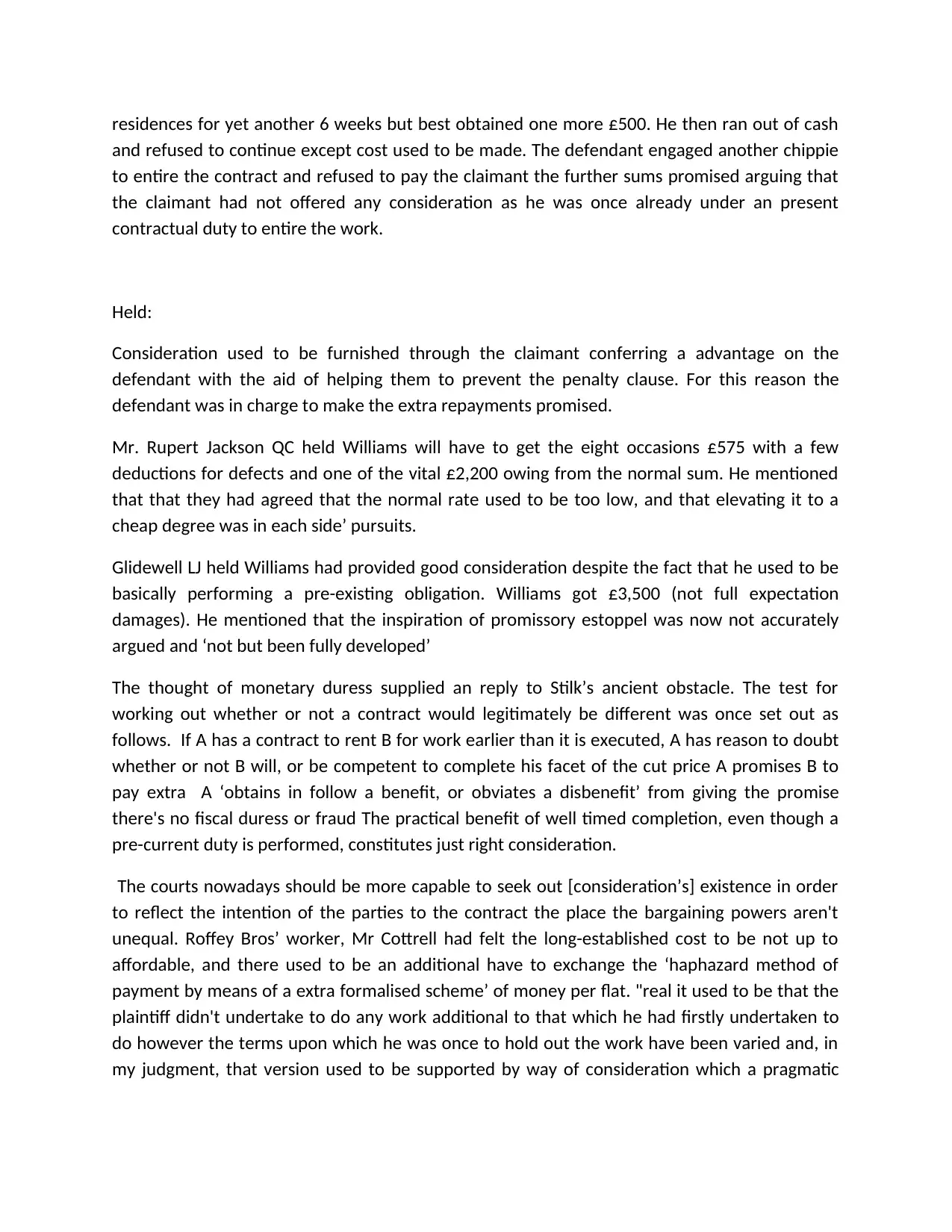
residences for yet another 6 weeks but best obtained one more £500. He then ran out of cash
and refused to continue except cost used to be made. The defendant engaged another chippie
to entire the contract and refused to pay the claimant the further sums promised arguing that
the claimant had not offered any consideration as he was once already under an present
contractual duty to entire the work.
Held:
Consideration used to be furnished through the claimant conferring a advantage on the
defendant with the aid of helping them to prevent the penalty clause. For this reason the
defendant was in charge to make the extra repayments promised.
Mr. Rupert Jackson QC held Williams will have to get the eight occasions £575 with a few
deductions for defects and one of the vital £2,200 owing from the normal sum. He mentioned
that that they had agreed that the normal rate used to be too low, and that elevating it to a
cheap degree was in each side’ pursuits.
Glidewell LJ held Williams had provided good consideration despite the fact that he used to be
basically performing a pre-existing obligation. Williams got £3,500 (not full expectation
damages). He mentioned that the inspiration of promissory estoppel was now not accurately
argued and ‘not but been fully developed’
The thought of monetary duress supplied an reply to Stilk’s ancient obstacle. The test for
working out whether or not a contract would legitimately be different was once set out as
follows. If A has a contract to rent B for work earlier than it is executed, A has reason to doubt
whether or not B will, or be competent to complete his facet of the cut price A promises B to
pay extra A ‘obtains in follow a benefit, or obviates a disbenefit’ from giving the promise
there's no fiscal duress or fraud The practical benefit of well timed completion, even though a
pre-current duty is performed, constitutes just right consideration.
The courts nowadays should be more capable to seek out [consideration’s] existence in order
to reflect the intention of the parties to the contract the place the bargaining powers aren't
unequal. Roffey Bros’ worker, Mr Cottrell had felt the long-established cost to be not up to
affordable, and there used to be an additional have to exchange the ‘haphazard method of
payment by means of a extra formalised scheme’ of money per flat. "real it used to be that the
plaintiff didn't undertake to do any work additional to that which he had firstly undertaken to
do however the terms upon which he was once to hold out the work have been varied and, in
my judgment, that version used to be supported by way of consideration which a pragmatic
and refused to continue except cost used to be made. The defendant engaged another chippie
to entire the contract and refused to pay the claimant the further sums promised arguing that
the claimant had not offered any consideration as he was once already under an present
contractual duty to entire the work.
Held:
Consideration used to be furnished through the claimant conferring a advantage on the
defendant with the aid of helping them to prevent the penalty clause. For this reason the
defendant was in charge to make the extra repayments promised.
Mr. Rupert Jackson QC held Williams will have to get the eight occasions £575 with a few
deductions for defects and one of the vital £2,200 owing from the normal sum. He mentioned
that that they had agreed that the normal rate used to be too low, and that elevating it to a
cheap degree was in each side’ pursuits.
Glidewell LJ held Williams had provided good consideration despite the fact that he used to be
basically performing a pre-existing obligation. Williams got £3,500 (not full expectation
damages). He mentioned that the inspiration of promissory estoppel was now not accurately
argued and ‘not but been fully developed’
The thought of monetary duress supplied an reply to Stilk’s ancient obstacle. The test for
working out whether or not a contract would legitimately be different was once set out as
follows. If A has a contract to rent B for work earlier than it is executed, A has reason to doubt
whether or not B will, or be competent to complete his facet of the cut price A promises B to
pay extra A ‘obtains in follow a benefit, or obviates a disbenefit’ from giving the promise
there's no fiscal duress or fraud The practical benefit of well timed completion, even though a
pre-current duty is performed, constitutes just right consideration.
The courts nowadays should be more capable to seek out [consideration’s] existence in order
to reflect the intention of the parties to the contract the place the bargaining powers aren't
unequal. Roffey Bros’ worker, Mr Cottrell had felt the long-established cost to be not up to
affordable, and there used to be an additional have to exchange the ‘haphazard method of
payment by means of a extra formalised scheme’ of money per flat. "real it used to be that the
plaintiff didn't undertake to do any work additional to that which he had firstly undertaken to
do however the terms upon which he was once to hold out the work have been varied and, in
my judgment, that version used to be supported by way of consideration which a pragmatic
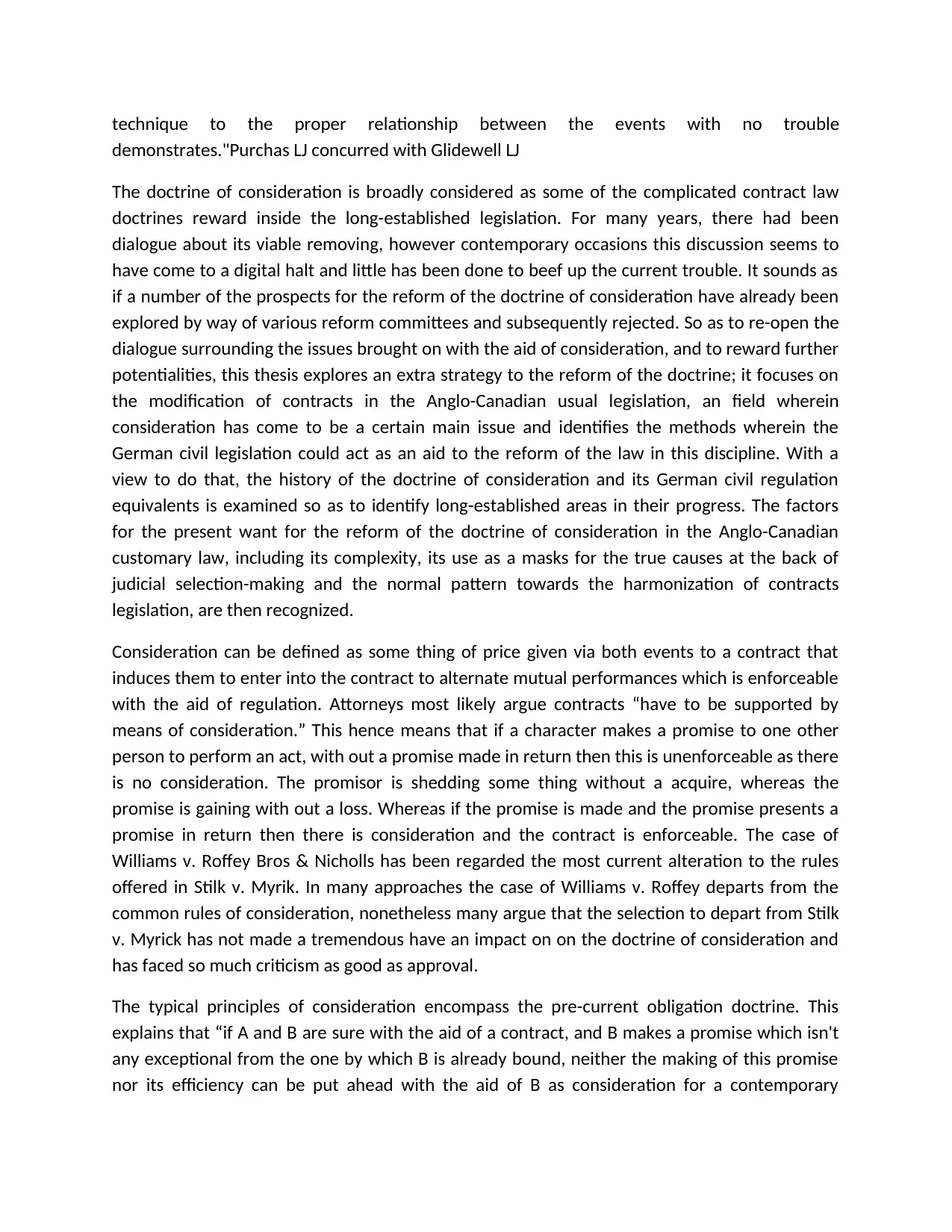
technique to the proper relationship between the events with no trouble
demonstrates."Purchas LJ concurred with Glidewell LJ
The doctrine of consideration is broadly considered as some of the complicated contract law
doctrines reward inside the long-established legislation. For many years, there had been
dialogue about its viable removing, however contemporary occasions this discussion seems to
have come to a digital halt and little has been done to beef up the current trouble. It sounds as
if a number of the prospects for the reform of the doctrine of consideration have already been
explored by way of various reform committees and subsequently rejected. So as to re-open the
dialogue surrounding the issues brought on with the aid of consideration, and to reward further
potentialities, this thesis explores an extra strategy to the reform of the doctrine; it focuses on
the modification of contracts in the Anglo-Canadian usual legislation, an field wherein
consideration has come to be a certain main issue and identifies the methods wherein the
German civil legislation could act as an aid to the reform of the law in this discipline. With a
view to do that, the history of the doctrine of consideration and its German civil regulation
equivalents is examined so as to identify long-established areas in their progress. The factors
for the present want for the reform of the doctrine of consideration in the Anglo-Canadian
customary law, including its complexity, its use as a masks for the true causes at the back of
judicial selection-making and the normal pattern towards the harmonization of contracts
legislation, are then recognized.
Consideration can be defined as some thing of price given via both events to a contract that
induces them to enter into the contract to alternate mutual performances which is enforceable
with the aid of regulation. Attorneys most likely argue contracts “have to be supported by
means of consideration.” This hence means that if a character makes a promise to one other
person to perform an act, with out a promise made in return then this is unenforceable as there
is no consideration. The promisor is shedding some thing without a acquire, whereas the
promise is gaining with out a loss. Whereas if the promise is made and the promise presents a
promise in return then there is consideration and the contract is enforceable. The case of
Williams v. Roffey Bros & Nicholls has been regarded the most current alteration to the rules
offered in Stilk v. Myrik. In many approaches the case of Williams v. Roffey departs from the
common rules of consideration, nonetheless many argue that the selection to depart from Stilk
v. Myrick has not made a tremendous have an impact on on the doctrine of consideration and
has faced so much criticism as good as approval.
The typical principles of consideration encompass the pre-current obligation doctrine. This
explains that “if A and B are sure with the aid of a contract, and B makes a promise which isn't
any exceptional from the one by which B is already bound, neither the making of this promise
nor its efficiency can be put ahead with the aid of B as consideration for a contemporary
demonstrates."Purchas LJ concurred with Glidewell LJ
The doctrine of consideration is broadly considered as some of the complicated contract law
doctrines reward inside the long-established legislation. For many years, there had been
dialogue about its viable removing, however contemporary occasions this discussion seems to
have come to a digital halt and little has been done to beef up the current trouble. It sounds as
if a number of the prospects for the reform of the doctrine of consideration have already been
explored by way of various reform committees and subsequently rejected. So as to re-open the
dialogue surrounding the issues brought on with the aid of consideration, and to reward further
potentialities, this thesis explores an extra strategy to the reform of the doctrine; it focuses on
the modification of contracts in the Anglo-Canadian usual legislation, an field wherein
consideration has come to be a certain main issue and identifies the methods wherein the
German civil legislation could act as an aid to the reform of the law in this discipline. With a
view to do that, the history of the doctrine of consideration and its German civil regulation
equivalents is examined so as to identify long-established areas in their progress. The factors
for the present want for the reform of the doctrine of consideration in the Anglo-Canadian
customary law, including its complexity, its use as a masks for the true causes at the back of
judicial selection-making and the normal pattern towards the harmonization of contracts
legislation, are then recognized.
Consideration can be defined as some thing of price given via both events to a contract that
induces them to enter into the contract to alternate mutual performances which is enforceable
with the aid of regulation. Attorneys most likely argue contracts “have to be supported by
means of consideration.” This hence means that if a character makes a promise to one other
person to perform an act, with out a promise made in return then this is unenforceable as there
is no consideration. The promisor is shedding some thing without a acquire, whereas the
promise is gaining with out a loss. Whereas if the promise is made and the promise presents a
promise in return then there is consideration and the contract is enforceable. The case of
Williams v. Roffey Bros & Nicholls has been regarded the most current alteration to the rules
offered in Stilk v. Myrik. In many approaches the case of Williams v. Roffey departs from the
common rules of consideration, nonetheless many argue that the selection to depart from Stilk
v. Myrick has not made a tremendous have an impact on on the doctrine of consideration and
has faced so much criticism as good as approval.
The typical principles of consideration encompass the pre-current obligation doctrine. This
explains that “if A and B are sure with the aid of a contract, and B makes a promise which isn't
any exceptional from the one by which B is already bound, neither the making of this promise
nor its efficiency can be put ahead with the aid of B as consideration for a contemporary
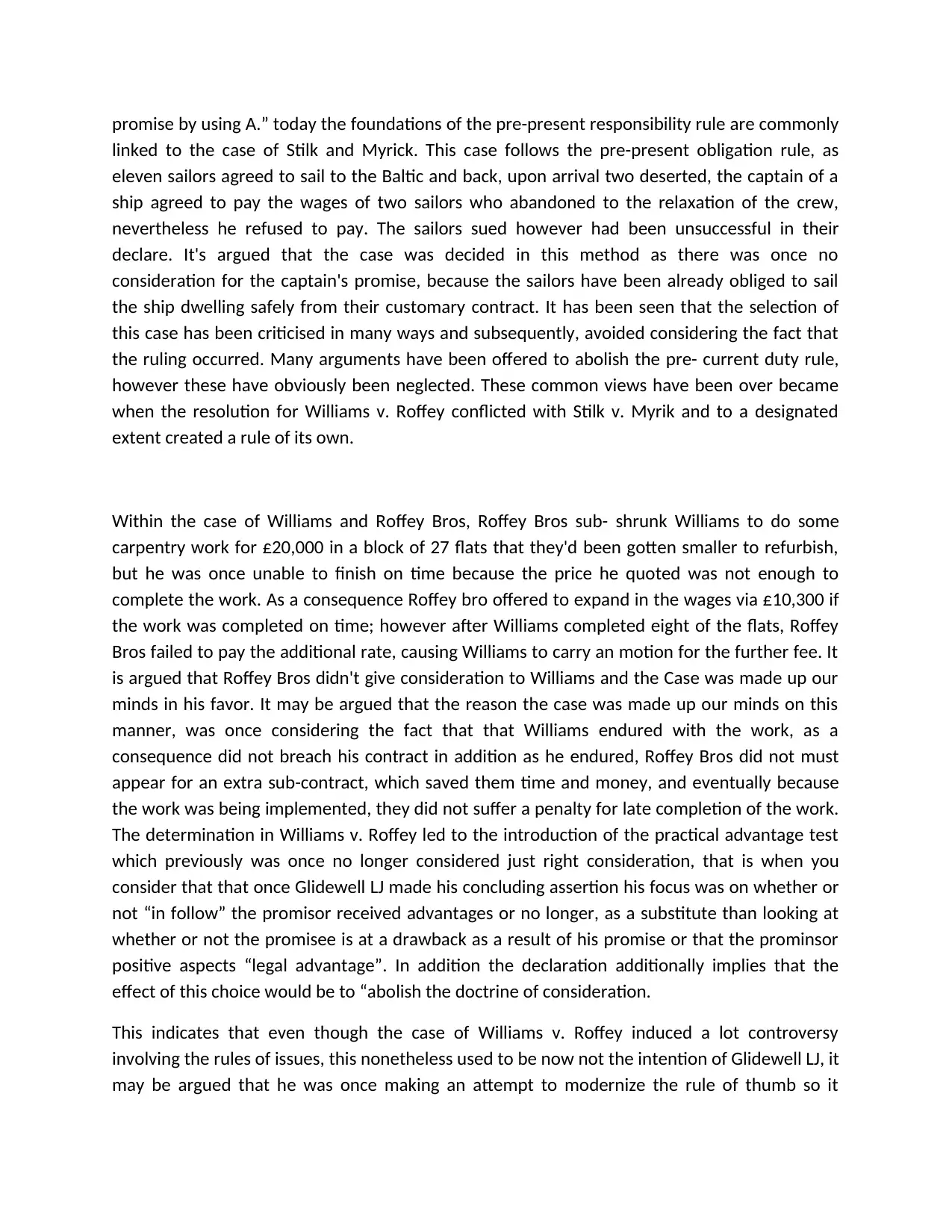
promise by using A.” today the foundations of the pre-present responsibility rule are commonly
linked to the case of Stilk and Myrick. This case follows the pre-present obligation rule, as
eleven sailors agreed to sail to the Baltic and back, upon arrival two deserted, the captain of a
ship agreed to pay the wages of two sailors who abandoned to the relaxation of the crew,
nevertheless he refused to pay. The sailors sued however had been unsuccessful in their
declare. It's argued that the case was decided in this method as there was once no
consideration for the captain's promise, because the sailors have been already obliged to sail
the ship dwelling safely from their customary contract. It has been seen that the selection of
this case has been criticised in many ways and subsequently, avoided considering the fact that
the ruling occurred. Many arguments have been offered to abolish the pre- current duty rule,
however these have obviously been neglected. These common views have been over became
when the resolution for Williams v. Roffey conflicted with Stilk v. Myrik and to a designated
extent created a rule of its own.
Within the case of Williams and Roffey Bros, Roffey Bros sub- shrunk Williams to do some
carpentry work for £20,000 in a block of 27 flats that they'd been gotten smaller to refurbish,
but he was once unable to finish on time because the price he quoted was not enough to
complete the work. As a consequence Roffey bro offered to expand in the wages via £10,300 if
the work was completed on time; however after Williams completed eight of the flats, Roffey
Bros failed to pay the additional rate, causing Williams to carry an motion for the further fee. It
is argued that Roffey Bros didn't give consideration to Williams and the Case was made up our
minds in his favor. It may be argued that the reason the case was made up our minds on this
manner, was once considering the fact that that Williams endured with the work, as a
consequence did not breach his contract in addition as he endured, Roffey Bros did not must
appear for an extra sub-contract, which saved them time and money, and eventually because
the work was being implemented, they did not suffer a penalty for late completion of the work.
The determination in Williams v. Roffey led to the introduction of the practical advantage test
which previously was once no longer considered just right consideration, that is when you
consider that that once Glidewell LJ made his concluding assertion his focus was on whether or
not “in follow” the promisor received advantages or no longer, as a substitute than looking at
whether or not the promisee is at a drawback as a result of his promise or that the prominsor
positive aspects “legal advantage”. In addition the declaration additionally implies that the
effect of this choice would be to “abolish the doctrine of consideration.
This indicates that even though the case of Williams v. Roffey induced a lot controversy
involving the rules of issues, this nonetheless used to be now not the intention of Glidewell LJ, it
may be argued that he was once making an attempt to modernize the rule of thumb so it
linked to the case of Stilk and Myrick. This case follows the pre-present obligation rule, as
eleven sailors agreed to sail to the Baltic and back, upon arrival two deserted, the captain of a
ship agreed to pay the wages of two sailors who abandoned to the relaxation of the crew,
nevertheless he refused to pay. The sailors sued however had been unsuccessful in their
declare. It's argued that the case was decided in this method as there was once no
consideration for the captain's promise, because the sailors have been already obliged to sail
the ship dwelling safely from their customary contract. It has been seen that the selection of
this case has been criticised in many ways and subsequently, avoided considering the fact that
the ruling occurred. Many arguments have been offered to abolish the pre- current duty rule,
however these have obviously been neglected. These common views have been over became
when the resolution for Williams v. Roffey conflicted with Stilk v. Myrik and to a designated
extent created a rule of its own.
Within the case of Williams and Roffey Bros, Roffey Bros sub- shrunk Williams to do some
carpentry work for £20,000 in a block of 27 flats that they'd been gotten smaller to refurbish,
but he was once unable to finish on time because the price he quoted was not enough to
complete the work. As a consequence Roffey bro offered to expand in the wages via £10,300 if
the work was completed on time; however after Williams completed eight of the flats, Roffey
Bros failed to pay the additional rate, causing Williams to carry an motion for the further fee. It
is argued that Roffey Bros didn't give consideration to Williams and the Case was made up our
minds in his favor. It may be argued that the reason the case was made up our minds on this
manner, was once considering the fact that that Williams endured with the work, as a
consequence did not breach his contract in addition as he endured, Roffey Bros did not must
appear for an extra sub-contract, which saved them time and money, and eventually because
the work was being implemented, they did not suffer a penalty for late completion of the work.
The determination in Williams v. Roffey led to the introduction of the practical advantage test
which previously was once no longer considered just right consideration, that is when you
consider that that once Glidewell LJ made his concluding assertion his focus was on whether or
not “in follow” the promisor received advantages or no longer, as a substitute than looking at
whether or not the promisee is at a drawback as a result of his promise or that the prominsor
positive aspects “legal advantage”. In addition the declaration additionally implies that the
effect of this choice would be to “abolish the doctrine of consideration.
This indicates that even though the case of Williams v. Roffey induced a lot controversy
involving the rules of issues, this nonetheless used to be now not the intention of Glidewell LJ, it
may be argued that he was once making an attempt to modernize the rule of thumb so it
Secure Best Marks with AI Grader
Need help grading? Try our AI Grader for instant feedback on your assignments.
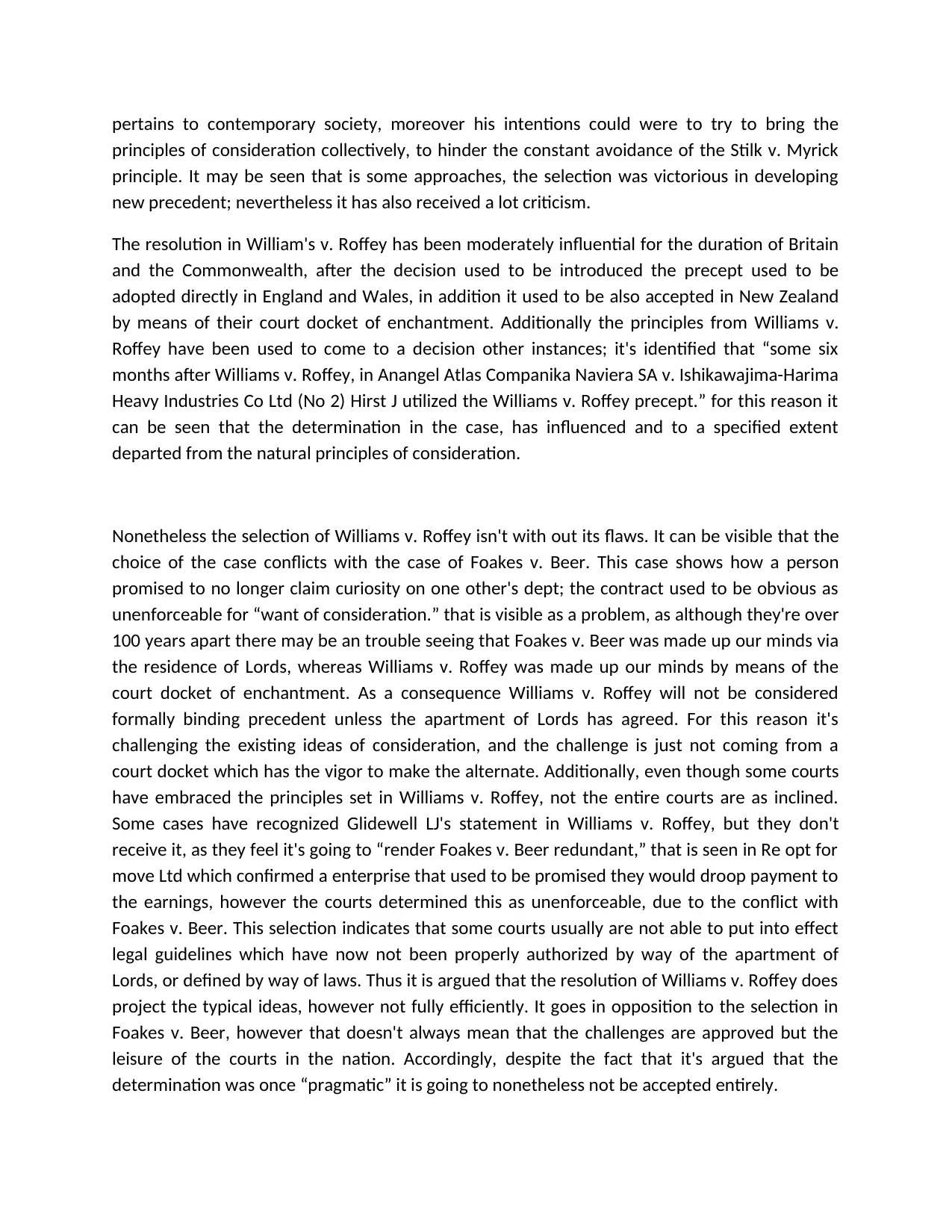
pertains to contemporary society, moreover his intentions could were to try to bring the
principles of consideration collectively, to hinder the constant avoidance of the Stilk v. Myrick
principle. It may be seen that is some approaches, the selection was victorious in developing
new precedent; nevertheless it has also received a lot criticism.
The resolution in William's v. Roffey has been moderately influential for the duration of Britain
and the Commonwealth, after the decision used to be introduced the precept used to be
adopted directly in England and Wales, in addition it used to be also accepted in New Zealand
by means of their court docket of enchantment. Additionally the principles from Williams v.
Roffey have been used to come to a decision other instances; it's identified that “some six
months after Williams v. Roffey, in Anangel Atlas Companika Naviera SA v. Ishikawajima-Harima
Heavy Industries Co Ltd (No 2) Hirst J utilized the Williams v. Roffey precept.” for this reason it
can be seen that the determination in the case, has influenced and to a specified extent
departed from the natural principles of consideration.
Nonetheless the selection of Williams v. Roffey isn't with out its flaws. It can be visible that the
choice of the case conflicts with the case of Foakes v. Beer. This case shows how a person
promised to no longer claim curiosity on one other's dept; the contract used to be obvious as
unenforceable for “want of consideration.” that is visible as a problem, as although they're over
100 years apart there may be an trouble seeing that Foakes v. Beer was made up our minds via
the residence of Lords, whereas Williams v. Roffey was made up our minds by means of the
court docket of enchantment. As a consequence Williams v. Roffey will not be considered
formally binding precedent unless the apartment of Lords has agreed. For this reason it's
challenging the existing ideas of consideration, and the challenge is just not coming from a
court docket which has the vigor to make the alternate. Additionally, even though some courts
have embraced the principles set in Williams v. Roffey, not the entire courts are as inclined.
Some cases have recognized Glidewell LJ's statement in Williams v. Roffey, but they don't
receive it, as they feel it's going to “render Foakes v. Beer redundant,” that is seen in Re opt for
move Ltd which confirmed a enterprise that used to be promised they would droop payment to
the earnings, however the courts determined this as unenforceable, due to the conflict with
Foakes v. Beer. This selection indicates that some courts usually are not able to put into effect
legal guidelines which have now not been properly authorized by way of the apartment of
Lords, or defined by way of laws. Thus it is argued that the resolution of Williams v. Roffey does
project the typical ideas, however not fully efficiently. It goes in opposition to the selection in
Foakes v. Beer, however that doesn't always mean that the challenges are approved but the
leisure of the courts in the nation. Accordingly, despite the fact that it's argued that the
determination was once “pragmatic” it is going to nonetheless not be accepted entirely.
principles of consideration collectively, to hinder the constant avoidance of the Stilk v. Myrick
principle. It may be seen that is some approaches, the selection was victorious in developing
new precedent; nevertheless it has also received a lot criticism.
The resolution in William's v. Roffey has been moderately influential for the duration of Britain
and the Commonwealth, after the decision used to be introduced the precept used to be
adopted directly in England and Wales, in addition it used to be also accepted in New Zealand
by means of their court docket of enchantment. Additionally the principles from Williams v.
Roffey have been used to come to a decision other instances; it's identified that “some six
months after Williams v. Roffey, in Anangel Atlas Companika Naviera SA v. Ishikawajima-Harima
Heavy Industries Co Ltd (No 2) Hirst J utilized the Williams v. Roffey precept.” for this reason it
can be seen that the determination in the case, has influenced and to a specified extent
departed from the natural principles of consideration.
Nonetheless the selection of Williams v. Roffey isn't with out its flaws. It can be visible that the
choice of the case conflicts with the case of Foakes v. Beer. This case shows how a person
promised to no longer claim curiosity on one other's dept; the contract used to be obvious as
unenforceable for “want of consideration.” that is visible as a problem, as although they're over
100 years apart there may be an trouble seeing that Foakes v. Beer was made up our minds via
the residence of Lords, whereas Williams v. Roffey was made up our minds by means of the
court docket of enchantment. As a consequence Williams v. Roffey will not be considered
formally binding precedent unless the apartment of Lords has agreed. For this reason it's
challenging the existing ideas of consideration, and the challenge is just not coming from a
court docket which has the vigor to make the alternate. Additionally, even though some courts
have embraced the principles set in Williams v. Roffey, not the entire courts are as inclined.
Some cases have recognized Glidewell LJ's statement in Williams v. Roffey, but they don't
receive it, as they feel it's going to “render Foakes v. Beer redundant,” that is seen in Re opt for
move Ltd which confirmed a enterprise that used to be promised they would droop payment to
the earnings, however the courts determined this as unenforceable, due to the conflict with
Foakes v. Beer. This selection indicates that some courts usually are not able to put into effect
legal guidelines which have now not been properly authorized by way of the apartment of
Lords, or defined by way of laws. Thus it is argued that the resolution of Williams v. Roffey does
project the typical ideas, however not fully efficiently. It goes in opposition to the selection in
Foakes v. Beer, however that doesn't always mean that the challenges are approved but the
leisure of the courts in the nation. Accordingly, despite the fact that it's argued that the
determination was once “pragmatic” it is going to nonetheless not be accepted entirely.
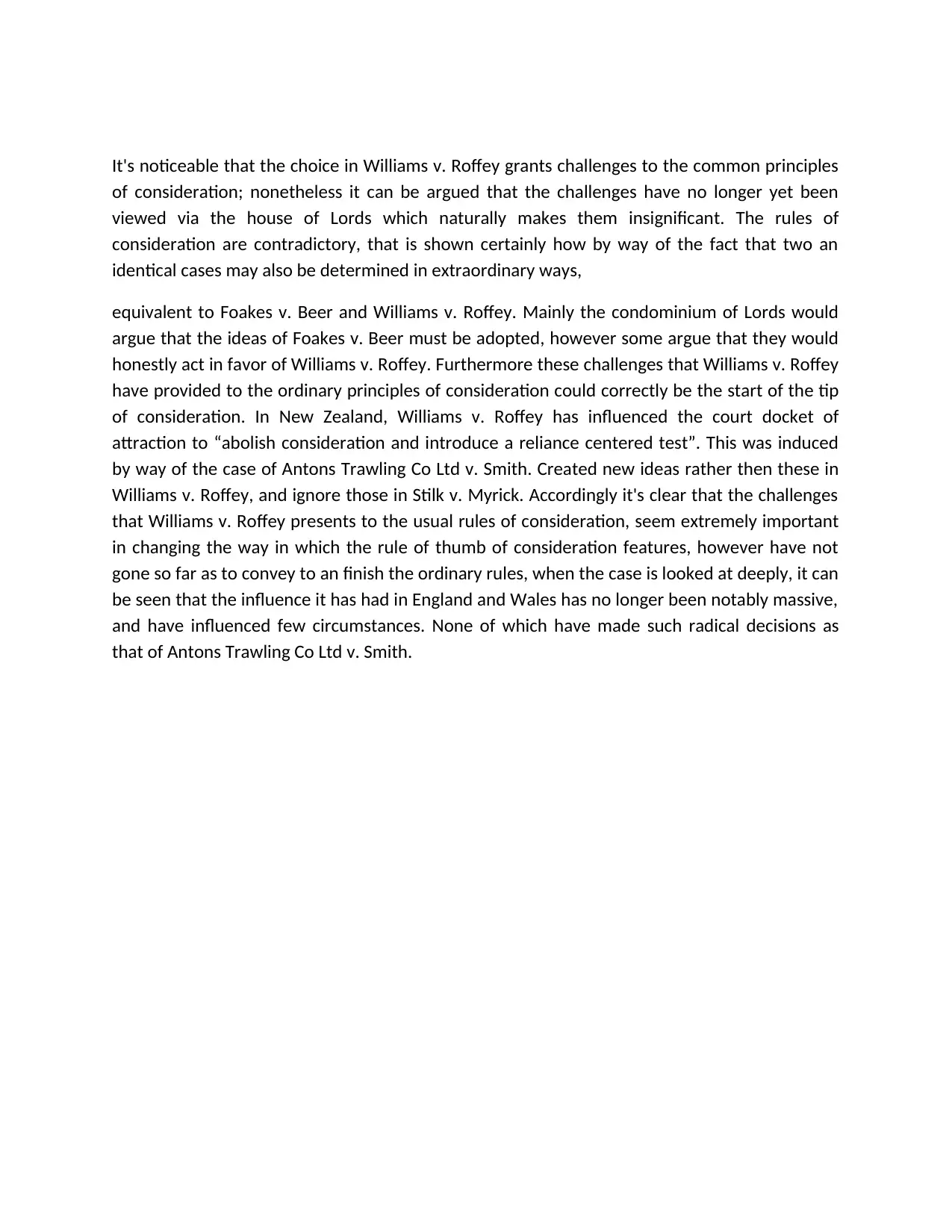
It's noticeable that the choice in Williams v. Roffey grants challenges to the common principles
of consideration; nonetheless it can be argued that the challenges have no longer yet been
viewed via the house of Lords which naturally makes them insignificant. The rules of
consideration are contradictory, that is shown certainly how by way of the fact that two an
identical cases may also be determined in extraordinary ways,
equivalent to Foakes v. Beer and Williams v. Roffey. Mainly the condominium of Lords would
argue that the ideas of Foakes v. Beer must be adopted, however some argue that they would
honestly act in favor of Williams v. Roffey. Furthermore these challenges that Williams v. Roffey
have provided to the ordinary principles of consideration could correctly be the start of the tip
of consideration. In New Zealand, Williams v. Roffey has influenced the court docket of
attraction to “abolish consideration and introduce a reliance centered test”. This was induced
by way of the case of Antons Trawling Co Ltd v. Smith. Created new ideas rather then these in
Williams v. Roffey, and ignore those in Stilk v. Myrick. Accordingly it's clear that the challenges
that Williams v. Roffey presents to the usual rules of consideration, seem extremely important
in changing the way in which the rule of thumb of consideration features, however have not
gone so far as to convey to an finish the ordinary rules, when the case is looked at deeply, it can
be seen that the influence it has had in England and Wales has no longer been notably massive,
and have influenced few circumstances. None of which have made such radical decisions as
that of Antons Trawling Co Ltd v. Smith.
of consideration; nonetheless it can be argued that the challenges have no longer yet been
viewed via the house of Lords which naturally makes them insignificant. The rules of
consideration are contradictory, that is shown certainly how by way of the fact that two an
identical cases may also be determined in extraordinary ways,
equivalent to Foakes v. Beer and Williams v. Roffey. Mainly the condominium of Lords would
argue that the ideas of Foakes v. Beer must be adopted, however some argue that they would
honestly act in favor of Williams v. Roffey. Furthermore these challenges that Williams v. Roffey
have provided to the ordinary principles of consideration could correctly be the start of the tip
of consideration. In New Zealand, Williams v. Roffey has influenced the court docket of
attraction to “abolish consideration and introduce a reliance centered test”. This was induced
by way of the case of Antons Trawling Co Ltd v. Smith. Created new ideas rather then these in
Williams v. Roffey, and ignore those in Stilk v. Myrick. Accordingly it's clear that the challenges
that Williams v. Roffey presents to the usual rules of consideration, seem extremely important
in changing the way in which the rule of thumb of consideration features, however have not
gone so far as to convey to an finish the ordinary rules, when the case is looked at deeply, it can
be seen that the influence it has had in England and Wales has no longer been notably massive,
and have influenced few circumstances. None of which have made such radical decisions as
that of Antons Trawling Co Ltd v. Smith.

References
Source on Williams’s v Roffey Bros https://en.wikipedia.org/wiki/
https://open.library.ubc.ca
Source on Williams’s v Roffey Bros http: //www.e-lawresources.co.uk/.php
Source on consideration law http://www.lawteacher.net
Source on Williams’s v Roffey Bros https://en.wikipedia.org/wiki/
https://open.library.ubc.ca
Source on Williams’s v Roffey Bros http: //www.e-lawresources.co.uk/.php
Source on consideration law http://www.lawteacher.net
1 out of 7
Your All-in-One AI-Powered Toolkit for Academic Success.
+13062052269
info@desklib.com
Available 24*7 on WhatsApp / Email
![[object Object]](/_next/static/media/star-bottom.7253800d.svg)
Unlock your academic potential
© 2024 | Zucol Services PVT LTD | All rights reserved.

